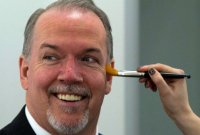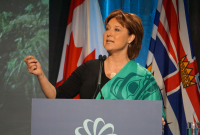Support strong Canadian climate journalism for 2025
Like many parents, B.C. New Democratic Party leader John Horgan gets emotional when he speaks about his children, even though they're all grown up.
His two sons motivate him to tackle climate change in British Columbia, he told supporters, constituents and climate campaigners at a speaking event in Vancouver on Monday.
“For the next generation, are we leaving the earth better than we found it?" Horgan asked. "I’m not convinced that we are anymore. If we are going to prepare B.C. for the inevitable, undeniable future of climate change, we need to change the government."
The event was hosted by the Broadbent Institute, a progressive, independent organization that promotes democracy and sustainability through leadership training. It was a well-timed opportunity for Horgan — only two weeks after B.C. Liberal Premier Christy Clark approved a controversial oilsands expansion pipeline, and roughly four months before he faces her in a spring provincial election.
Horgan, the Official Opposition leader, focused on what he believes are two of B.C.'s greatest challenges: tackling climate change and reducing economic inequality. He said seeing a coastal First Nation struggle with the impact of a diesel spill in its waters informed his recently-adopted strong stance against the Kinder Morgan Trans Mountain expansion project, which has a green light from the provincial and federal governments.
Applause echoed through the room as he pledged to reduce greenhouse gas emissions in B.C. and make climate change "integral to policy decisions."

Horgan sharpens stance against Kinder Morgan
Some critics have accused him in the past of advocating wishy washy policies around energy and environmental issues to avoid wrath from voters on the right.
But during his speech on Monday, Horgan took a firmer stance. He said B.C. — now on track for an increase in carbon emissions by a margin of 39 per cent by 2030 — needs to become a climate leader, as it once was under former premier Gordon Campbell. He also said the province must "say no" to the Kinder Morgan Trans Mountain pipeline expansion, which, if built, would ship roughly 890,000 barrels of crude oil and petroleum daily to refineries and terminals near Vancouver and Washington, sending local tanker traffic soaring.
"Christy Clark’s pipelines and tanker traffic are a risk we cannot afford," he told the audience. "Working for people and communities, investing in safe and dignified work that pays a living wage, achieving true reconciliation and economic opportunity for First Nations, and embracing environmental stewardship that is second to none... We will do it by standing firm against projects that take us in the wrong direction."
The Trans Mountain expansion is a polarizing issue in B.C., where dozens of First Nations and some Lower Mainland municipalities stand opposed to the project. Supporters say it would create more than $46 billion in revenue for provincial and federal governments and at least 15,000 jobs annually during construction, while opponents argue it would cross unceded indigenous territory, increase tanker traffic in local waters by 600 per cent, and threaten endangered local orca populations.
Two days after Premier Clark approved the project, Horgan released a video of a jar of bitumen that had been sitting on his desk and contemplated out loud what a Trans Mountain spill on the coast would cost. It was a contrast to his comments in a June 2016 interview with National Observer, when he said “at this point” he couldn’t see how the project was in B.C.’s interest, but would see how the discussion unfolded over the next year.
Focused on clean energy opportunities
Despite his criticism Monday, Horgan recognized the importance of B.C.'s natural resource economy. As someone who spent his youth in a mill and a joinery, he said he has personally benefited from it, but he also said that hotter annual temperatures as a result of climate change are forcing him to ask critical questions about resource development.
He accused the Clark government of fixating on energy solutions “from the 1950s” to solve 21st century energy issues, and said was not in the province's best economic interest to export raw crude to Asia. More jobs could be created by investing in clean technology or by upgrading the crude in Canada, he asserted. Horgan said he intends to focus more on clean energy jobs for communities that are currently reliant on a single industry, such as logging.
“We have to connect with people about this challenge of our time," he explained. "We have to do it in a way that shows the opportunities and potential, not just here in B.C., and not just across Canada, but internationally.”
In an on-stage interview following Horgan's talk, environmental advocate and York University adjunct professor Tzeporah Berman echoed many of Horgan's sentiments. She said her own children push her to envision clean energy projects that people can suppoort, rather than to simply say 'no' to proposed fossil fuel energy projects.
Sitting next to her, Horgan agreed, and said there are enormous clean energy opportunities that countries like China are seizing, while at home, Clark's Liberals focus on liquefied natural gas (LNG) development. He told her his party had put aside its historic divisions over the province's carbon tax policy, referring to the 2009 provincial election in which the NDP tussled over the carbon tax implemented by the Liberals, over fear that it would disproportionately affect rural British Columbians.
Strong climate stance could be an election risk
While scoring points with the Broadbent Institute audience in Vancouver, Horgan's sharpened stance on climate protection and the Kinder Morgan pipeline expansion may not pay off elsewhere in the province. In 2013, Horgan's predecessor Adrian Dix is said to have lost the provincial election to Clark partly due to last-minute flip-flopping to oppose the oilsands expansion project.
Horgan said he feels motivated when visiting clean energy companies across the Lower Mainland, and hopes that if his party wins the May election, they can put more support behind renewable energy initiatives, rather than just focusing on traditional fossil fuel projects.
The T'Souke First Nation on Vancouver Island, where Horgan grew up, is an excellent example, he said. The community adopted solar power early in 2007 and has been selling excess energy back to BC Hydro ever since.






Comments
"He accused the Clark government of fixating on energy solutions 'from the 1950s' to solve 21st century energy issues, and said was not in the province's best economic interest to export raw crude to Asia. More jobs could be created by investing in clean technology or by upgrading the crude in Canada, he asserted. Horgan said he intends to focus more on clean energy jobs for communities that are currently reliant on a single industry, such as logging." What the hell is John Horgan doing supporting investment in new fossil fuel infrastructure?
Let's hope he sticks to his guns. The climate needs a political party with the courage and understanding to spake for the future. I'd be proud if that turned out to be the party of Tommy Douglas.
One thing is for sure. 19th and 20th Century fossil fuel driven technology is not going to save us; it only exacerbates the runaway rise in greenhouse gases that will put all our futures at risk. And the election of Donald Trump and his merry band of psychopathic liars is a clear indication that mincing our words, choosing euphemisms and seeking to compromise with dinosaurs is not going to work.
In contrast to those who believe the world issues out of their mouth, we need to build a politics of hard truths and real innovation. I think it could be a wonderful time to be alive, if we work together for the future good of all....because for sure, fracking the hell out of our back country, ripping and shipping tar, and wasting fuel liquefying natural gas to transport it around the globe, is a get rich quick scheme worthy of the 1984 crowd to the south of us.
We're doomed if we let that pack of liars dictate our future.
and unfortunately, Mother Nature's vote can be neither bought or suppressed.
Let's hope he sticks to his guns. The climate needs a political party with the courage and understanding to spake for the future. I'd be proud if that turned out to be the party of Tommy Douglas.
One thing is for sure. 19th and 20th Century fossil fuel driven technology is not going to save us; it only exacerbates the runaway rise in greenhouse gases that will put all our futures at risk. And the election of Donald Trump and his merry band of psychopathic liars is a clear indication that mincing our words, choosing euphemisms and seeking to compromise with dinosaurs is not going to work.
In contrast to those who believe the world issues out of their mouth, we need to build a politics of hard truths and real innovation. I think it could be a wonderful time to be alive, if we work together for the future good of all....because for sure, fracking the hell out of our back country, ripping and shipping tar, and wasting fuel liquefying natural gas to transport it around the globe, is a get rich quick scheme worthy of the 1984 crowd to the south of us.
We're doomed if we let that pack of liars dictate our future.
and unfortunately, Mother Nature's vote can be neither bought or suppressed.